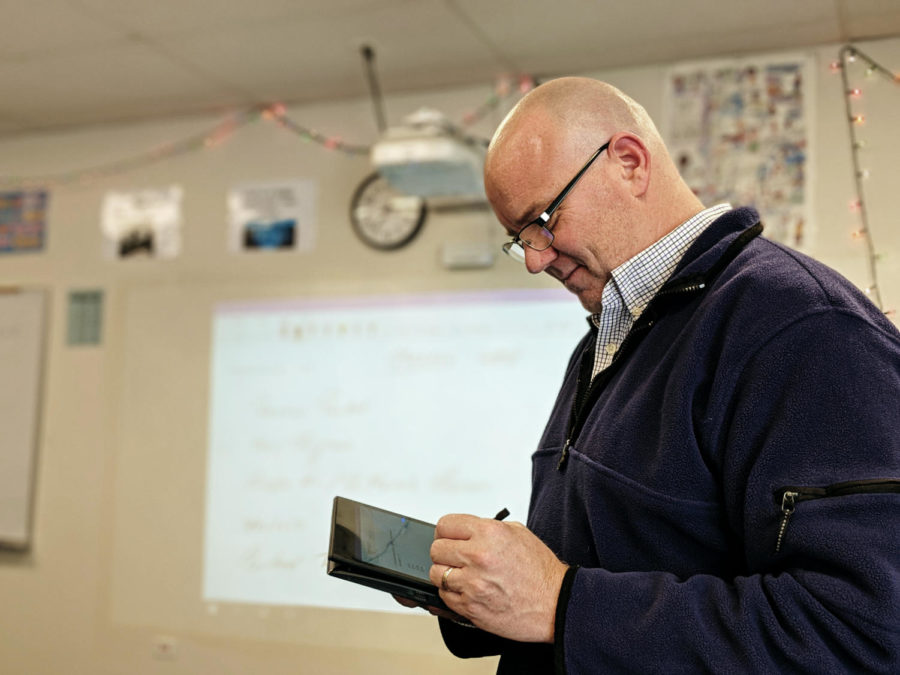Mr. Pardun takes a unique approach to teaching
Mr. Pardun, math teacher, writes notes on the board for students.
The hum of backpacks unzipping fills the room as Mr. Pardun begins reviewing the previous night’s activity. Yet, the few faces behind blank papers aren’t cowering in fear. Rather, most are hopeful that Mr. Pardun’s meticulous teaching style will prepare them.
Throughout the years in his career, Mr. Pardun, a mathematics teacher at VHHS, has precisely tuned his teaching style to dynamically adapt with each student’s needs.
He calls this approach to teaching “problem-based learning” and “inquiry-based learning.” Mr. Pardun will introduce a concept, then allow students to begin exploring what it has to offer in a small group. He then clarifies the problems from the exercise, and build connections to other units.
According to Mr. Pardun, this teaching style comes from other math teachers in the world who are using innovative techniques and getting incredible results.
By comparing the levels of understanding of his students in the past who were taught under a traditional lecture based model, he has found that his current students are getting a deeper understanding of mathematics.
Mr. Pardun makes this assessment based off of the grades students are getting in his class, which he believes is an accurate way to assess level of understanding.
“Being in a problem-based learning environment requires students to do a lot of thinking,” Mr. Korney, Math teacher and department supervisor said. “Perhaps more than they would in a traditional lecture-based classroom.”
The idea around this teaching style is to get students more engaged in the activities they’re working on, which is what Mr. Pardun and Mr. Korney are finding in their classrooms.
Along with this, Mr. Pardun uses an adaptive method for assigning homework, meaning the number of problems each student gets is assigned on an individual basis.
None of his assignments have grades attached; he feels that having graded homework due on a specific date is a negative thing.
“I have four children of my own, and I have watched all four of them be reduced to tears at the kitchen table because of homework,” Mr. Pardun said.
He pondered how much learning was actually taking place after witnessing this, and concluded it was “probably not a lot.” The correlation between homework completion and test scores, Mr. Pardun noted, is very little.
Phillip Swanson (12), a senior in Mr. Pardun’s precalculus class, claims that the absence of graded homework makes him feel more confident about going to class. He is able to learn at his own pace on his own time, which is the method of learning that Mr. Pardun is aiming for.
“Not having a structure does help you to formulate a structure for yourself,” Gabriella Sarmiento (12), another precalculus student, said. “It’s both good for [Mr. Pardun] and the student just because you’re able to work your schedules together…It’s like a partnership.”
Mr. Pardun works to create an environment where students are not as stressed out by mathematics. His goal is to create students that have a strong understanding of mathematics in a way where “math anxiety” becomes a thing of the past.
“[I look for] other math teachers in the world who are using innovative techniques in their classroom and getting incredible results…I look at the results that they’re getting, and look at results that I have gotten in the past and I say ‘I want to be more like them.’”

